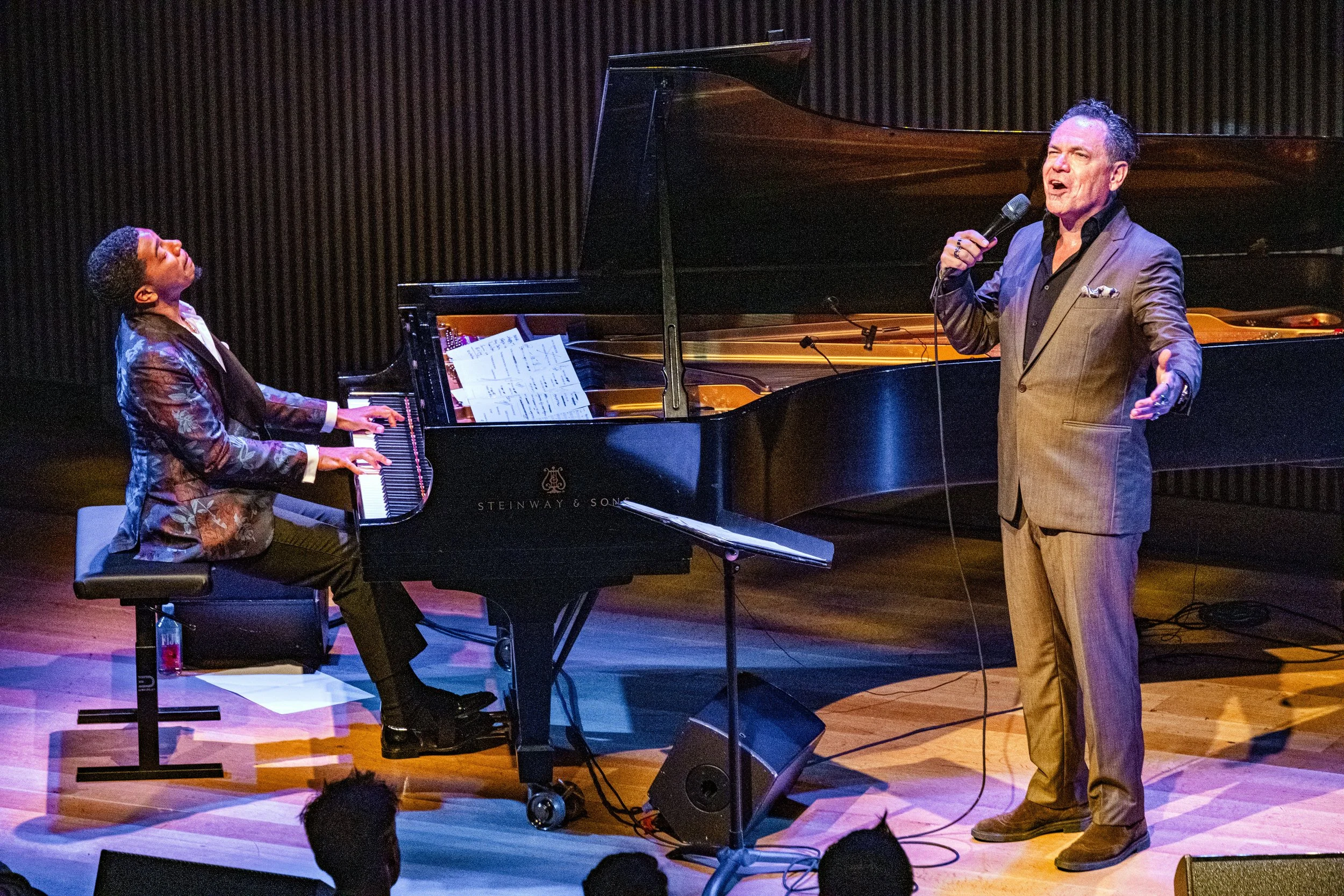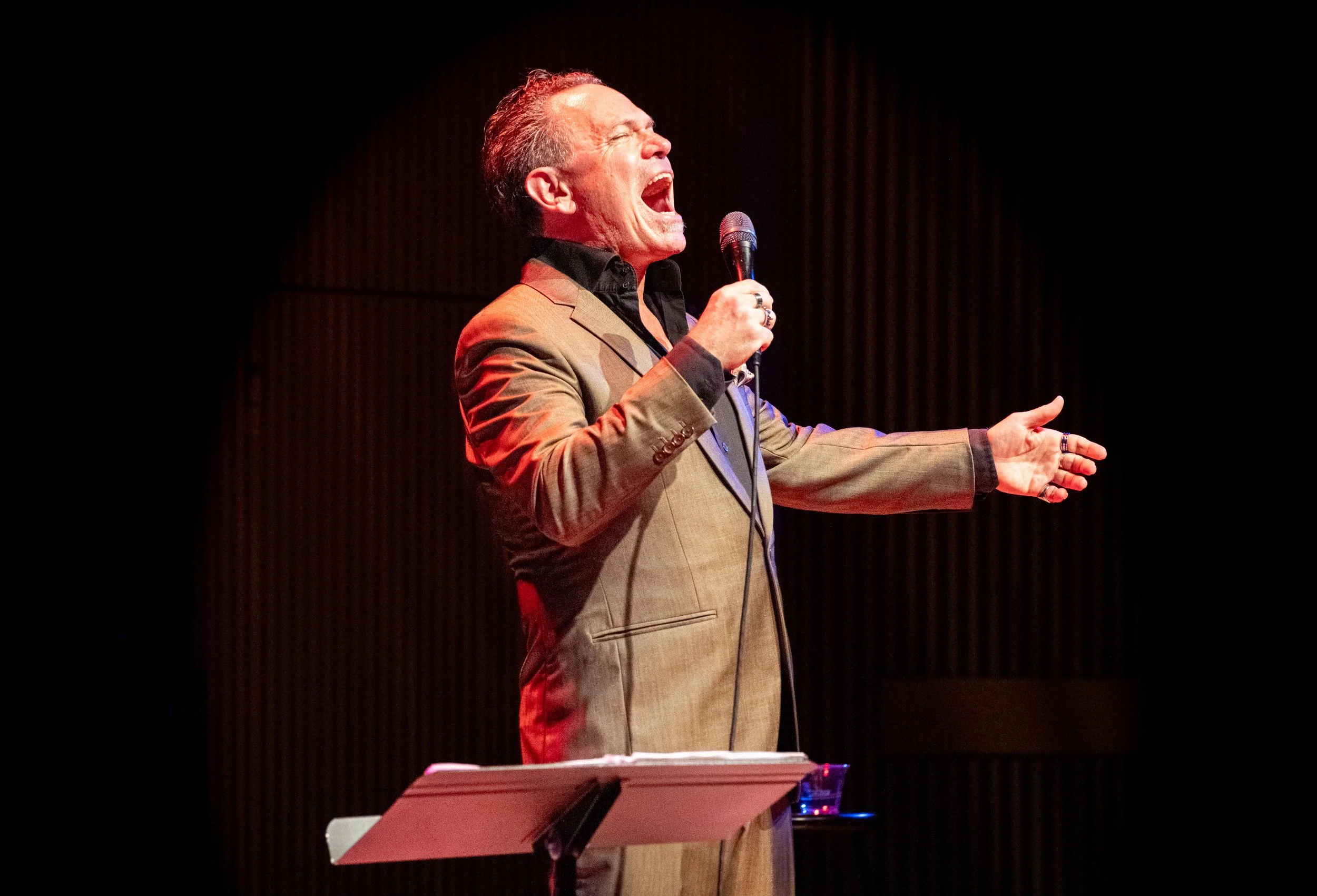Kurt Elling & Christian Sands: A Creative Force, In Concert and In Conversation
Christian Sands & Kurt Elling. Photo: Steve Roby
A spare duo becomes an engine—voice and piano reworking Monk, Ellington, theater, and rock into a present-tense argument for hope, empathy, and the living tradition of jazz.
As they walked on stage together, you could sense an easy camaraderie between Kurt Elling and Christian Sands. Elling playfully sketched shapes in the air, grinning in anticipation, while Sands settled in at the piano. Their first song, “Blue Monk,” immediately set the tone for the evening. They started with the familiar tune, but quickly began to twist and reimagine it—Elling’s voice digging into each note, Sands’s hands exploring unexpected rhythms and harmonies. This wasn’t just a performance; it reflected their partnership, built on trust and a willingness to take musical risks. They had just recorded this tune for Elling’s collaboration series, Wildflowers, and on stage, their chemistry was unmistakable.
Elling opened the concert by addressing the audience directly, acknowledging the difficult times everyone faces. He promised that their music wasn’t just entertainment, but a way to bring people together and to offer comfort and encouragement. He said, “We’re going to try to feed you tonight… jazz music has that possibility to remind us, to encourage us, to lift us, to bring us all into the same atmosphere together, and to be sort of taking care of each other.” This wasn’t just a passing comment—it was the heart of the show, and every song that followed supported that message.
You could really feel the power of words in the way Elling introduced “A Happy Thought.” He wove spoken poetry into the song so naturally that it became part of the music’s flow. This blending of literature and melody is classic Elling, but with just Sands at the piano, every nuance stood out. You could hear how carefully Elling shapes every word—sometimes lingering just a bit behind the beat to make a single phrase resonate. Sands supported him beautifully, using his piano to set the mood, letting the music breathe where the story needed space.
“I guess it’s a remarkable time in the world—horrors and terrors and all of it. We’re going to try to feed you tonight… jazz music has that possibility to remind us, to encourage us, to lift us, to bring us all into the same atmosphere together, and to be taking care of each other.”
All night, Elling and Sands approached classic songs not as museum pieces, but as lively conversations. Their take on Monk was playful and surprising, while their Ellington felt like a gentle welcome to a new day. Before “I Like the Sunrise,” Elling talked about Duke Ellington’s faith in finding hope, even in dark times. Sands echoed that feeling on the piano, playing slow, gentle chords that made the song feel like it was gradually reaching for the morning. Their respect for tradition gave them the freedom to experiment and make each piece feel fresh.
When they played newer songs, they didn’t feel out of place—they felt like natural extensions of the old favorites. Their performance of “My Son,” a lullaby from Guillermo del Toro’s Pinocchio, was especially touching. Sands started it quietly, as if ringing tiny bells, while Elling sang and honestly, letting the song’s emotion shine without overdoing it. In moments like this, they showed that jazz stays meaningful not by following trends, but by finding the heart of every song and bringing it to life through improvisation.
Kurt Elling. Photo: Steve Roby
The night’s fulcrum was a sequence that braided personal, political, and theatrical threads: “Song for the Rainbow People” into Steve Winwood’s “Can’t Find My Way Home,” then Elling’s Broadway debut in Hadestown. It was not medley gymnastics so much as a statement about shared DNA—gospel hope, rock lament, theater’s moral clarity—applied to the fear and noise of the moment. Elling’s commentary framed it as a call to empathy and will; Sands, ever the dramatist at the keyboard, thinned textures beneath the Winwood lyric until Elling’s voice stood nearly alone, then thickened them into a stage-ready swell as he nodded to Hadestown. The sequence argued not that “music will save us,” but that music trains the muscle memory for listening and courage.
What made the collaboration feel necessary rather than merely enjoyable was the way each artist kept sharpening the other. Elling is a master of proportion—how close to hover before fracturing a syllable for meaning, how much grit to bring to a phrase before cleaning the line. Sands loves structure enough to test its edges. His solos unfolded like arguments: a clear premise, an exploratory counterclaim, surprise evidence, and synthesis. In third acts, a rhythmic hunch—an off-beat accent, a left-hand ostinato edging toward stride—would send him chasing a new corridor. Elling, sensing the turn, became a percussionist: consonants clicking in time, feet marking the groove, body language underlining the passage. This was not a singer “fronting” a pianist; it was a genuine dialogue where roles traded places by the chorus.
“Long As You’re Living,” familiar from *Upward Spiral*, carried that spirit into a blues that sounded less like consolation and more like inventory—are we doing the work, are we taking care of each other? Elling’s behind-the-beat ease met Sands’s churchy punctuations in a civic handshake. The encore, “When October Goes,” avoided sentimental drift. Sands voiced the changes, so the fall metaphor landed as a simple fact; Elling tapered the final vowel until the room accepted silence as the only correct last chord.
Part of the evening’s magnetism came from how carefully it refused triumphalism. Elling’s rings—he joked elsewhere that they linger from his Broadway stint as Hermes—caught the lights like small prophecies, but the message wasn’t self-mythology. It was stewardship. Monk’s crooked wisdom and Ellington’s sunrise weren’t trophies to mount; they were tools for today’s work. The duo’s discipline—attend, respond, leave space—modeled a kind of civic musicianship. Even the show’s pop and theater references read less as crossover than as cartography, mapping where the tradition already runs: from the sanctified church to the rock lament to the stage where narrative meets groove.
If you chart the set, you hear a quiet manifesto. Jazz, for Elling and Sands, is not a museum of perfect replicas, but it is a workshop where history is tuned to present frequencies. The songs worked because they were treated as living texts—durable enough to hold new meaning. And the duo worked because each musician respects form without mistaking it for a fence. Sands’s architecture gave Elling the corridors he needed for language; Elling’s textual imagination gave Sands the stakes that turn virtuosity into story.
Sands & Elling. Photo: Steve Roby
The forward look is implied in their approach. Elling stands out as one of jazz music’s most articulate modern storytellers, a singer who treats words as instruments and instruments as voices. Sands is a pianist whose mastery of tradition serves as a springboard, not a safety net. Together, they form a creative force—one that argues, gently yet firmly, that the future of the standard isn’t preservation, but transformation done with care. If they keep pushing history forward at this pace, the songs we inherit will continue becoming the songs we need—sung and played by artists committed to carrying them into the weather ahead.
Program Notes
Musicians: Kurt Elling & Christian Sands
Venue: Miner Auditorium (SFJAZZ Center)
Location: San Francisco, California
Date/Showtime: Oct 4, 2025, 7:30 pm
Personnel
Kurt Elling - vocals
Christian Sands – piano
Setlist
"Blue Monk" - Composer(s): Thelonious Monk, Album/Source: Wildflowers, Vol. 3.
2. "A Happy Thought"/"September in the Rain"/On the Road (excerpt) Composer(s)/Text: Franz Wright (poem; text adapted by Elling), Al Dubin & Harry Warren/Jack Kerouac (text)
3. "My Son" - Composer(s): Guillermo del Toro & Alexandre Desplat. Album/Source: Pinocchio (Original Motion Picture Soundtrack)
4. "Song for the Rainbow People" / "Can't Find My Way Home" / "Hadestown" (excerpt), Composer(s): Kurt Elling (lyrics), Christian Sands (music)/Steve Winwood/Anaïs Mitchell.
5. "I Like The Sunrise" - Composer(s): Duke Ellington, Album/Source: Liberian Suite.
6. "Long As You’re Living"- Composer(s): Oscar Brown Jr., Julian Priester & Tommy Turrentine, Album/Source: Upward Spiral.
Encore
"When October Goes" - Composer(s): Barry Manilow & Johnny Mercer.



